Artists' Books
Artists' Books

Le Large
This light, pocketbook format publication by After 8 Books gathers works by French artist Julie Beaufils, and three short stories commissioned for the occasion, dealing altogether with social tensions and emotional explosions.
The ink drawings by Julie Beaufils that form the core of the book, follow a logic of editing, accumulation and narrative incompleteness: the figures come from memories of films or TV series, as sediments of mass culture, or sometimes from personal observations and experiences crystallized in images. Shapes and figures develop as an ambivalent collection, informed by the weight and the vibration of lines and strokes.
This book aims at triggering the interpretation of these works, and at making their “reading” more complex, more playful too. Graphic designer Scott Ponik composed a visual story close to a manga, part abstraction, part emotion. The narrative and affective potential of the drawings is further activated by their free association with three short stories by Michael Van den Abeele, Buck Ellison, and Reba Maybury. Van den Abeele tells about the inner thoughts of a donor at the sperm bank; Buck Ellison’s story follows a few hours in the life of some girls in the San Francisco area, dealing with the cruelty and the naïvety of their relationships; while Reba Maybury proposes an erotic analysis of the connection between desire and capitalism.
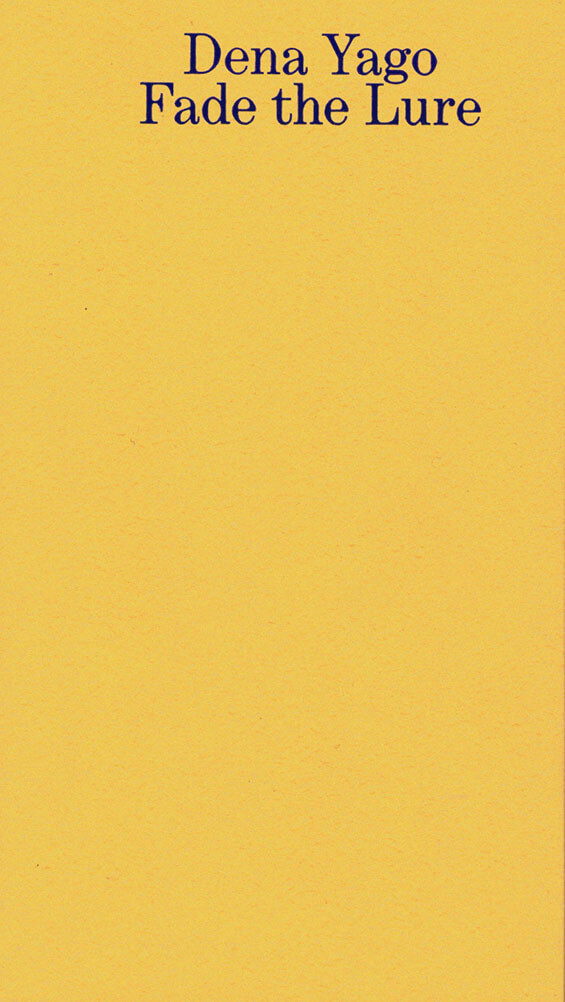
Fade the Lure
Fade the Lure is a collection of poems and photographs created between 2014 and 2017, during Dena Yago’s experience working and living alongside emotional support dogs in Los Angeles. In Yago’s words, poetry is sometimes “a form of communication created out of the desire to avoid, and an inability to engage in other forms of direct communication” with animals or humans. Fade the Lure explores the possibility for the poem to account for relationships that materialize and live beyond words, while being embedded in a consumerist society’s confined structures.
Dena Yago (born 1988, lives & works in NYC) is an artist, a writer and a poet. She was one of the founding members of K-HOLE, a trend forecasting group active from 2010 to 2016. Recent publications include Ambergris (Bodega) and Esprit Reprise (Pork Salad Press). Her work has been exhibited worldwide, including at the Museum of Modern Art in Warsaw and at Bodega in New York.

NIGHTNIGHT
In collaboration with Laurent Poleo-Garnier, NIGHTNIGHT is an archive of images and texts from different sources addressing the theme of the night. Over the book as a party that degenerates with fatigue, alcohol and other stimulants, images and layout deteriorate, the subjects get tired, the vision is cloudy...

Nails
Nails is an archive of images of hundreds of manicure tutorials on youtube. "I wanted to bring out the strangeness that emerges from these claws metallized, both prosthetic and disabling, both objects of desire and disgust. Throughout the book, we find ourselves lost in piles of flesh, varnish that establish the uncomfortable as much by the sexual character that emerges as the misunderstanding of the image."

NXS #4 Algorithmic Anxiety
NXS #4 Algorithmic Anxiety explores the spectrum of algorithmic authority over our lives (whether perceived or not). The contributors question or reveal the inconspicuous influence of algorithms, in their various forms, on our behavioral patterns, emotions, and self perceptions of our position in the world.

NXS #3 Viral Bodies
NXS issue #3 Viral Bodies investigates the changing concepts of gender and identity norms in the digital space, and open the discussion to many possible speculations and to their real world implications.
Kicking off the issue with a starting piece by Reba Maybury, over 20 fellow contributors explore social conventions, share intimate moments and experiences of pain, love, hate and fear. They delve into authenticity in the non-human sphere, they code accidental bigotry on the internet. Science fiction writer Alan Dean Foster blurs the lines of reality, transmitting what is real and what not in a dystopian society. Political art critic Penny Rafferty unravels the minds of tech giants while artistic researcher Addie Wagenknecht questions the diffusing lines between virtual technology and working bodies in reality.
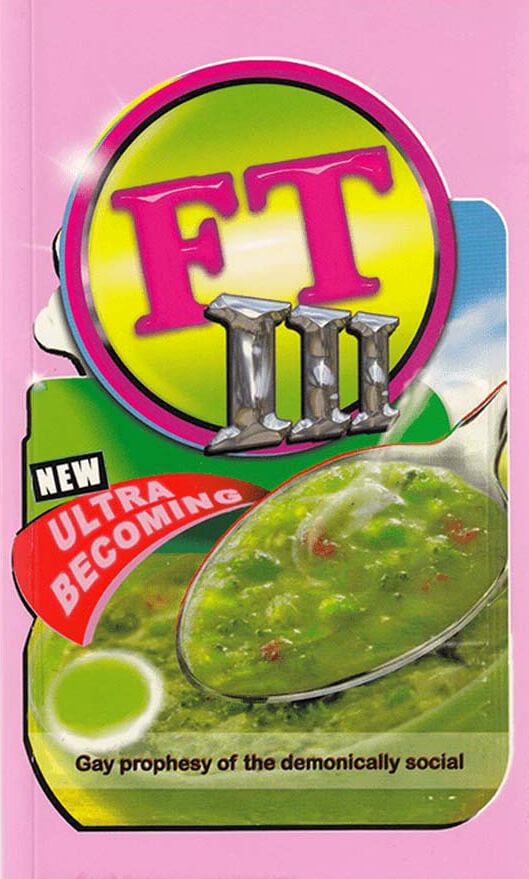
Frozen Tears III
Texts By: Kristen Alvanson, Stuart Bailey, Stephen Barber, Mark & Steve Beasley, Karla Black, Marianna Botey, Jesse Bransford & Casey Mckinney, Charles Bronson, Paul Buck, David Burrows & Simon O'sullivan, Bonnie Camplin, Lisa Castagner, Ccru/Orphan Drift, Dennis Cooper, Michael Corris, Esther Planas, Karen Cunningham, Kim Coleman & Jenny Hogarth, Michael Cross/ M Satai, John Cussans, Enrico David, Anthony Davies, Lorenzo De Los Angeles Iii, Madeline Djerjian, Peter Donaldson, Ross Downes, Electric Six, Patricia Ellis, John Espinosa, Dick Evans, Keith Farquhar, Dan Fox, Luca Frei, Barnaby Furnas & Ivette Zieghelboim, Tony Garifalakis, Babak Ghazi, Ilana Halperin, Mark Harris, Iain Hetherington, Damien Hirst, Klara Hobza, Stewart Home, Rachel Howe, Mark Hulson, Andy Hunt, Andrew Hughes, Gareth Jones, Kevin Killian, Kool Keith, Steve Klee, The Knockouts, Pete Lewis, Cedar Lewisohn, Fiona Lumbers, Patricia Macormack, Andrea Mason, Natt Mellors, Anna Mitchell, N.R.K Mohammad/ Sos Newsrod/ Dan Thurwen, Gean Moreno, Hv Morton, Donal Mosher, Neil Mulholland, Patrick Mullins, Yuki Muruyama, Reza Negarestani, No Bra, Paul Noble, Bernard Noel, David Osbaldeston/Joe Devlin, Arthur Ou, Mike Pare, Chloe Piene, Esther Planas, Elizabeth Price, Adam Putnam, Harry Pye, Hillary Raphael, The Rebel, Steve Rushton/Hubert Czerepok, Amelia Saul/Jo-Ey Tang, Kenji Siratori, Craig Slee, Alison Smith, Emma Stark, John Strutton, Francis Summers, Rebecca Taylor, Simon Thompson, Mark Tichner, Ian Titus, Dan Torop, Jeffrey Vallance, Harlan D Wilson, Benny Zadik.

Frozen Tears II
Texts By: Kathy Acker, Mireille Andrès, Antonin Artaud, Dominique Auch, Ned Baldwin, Stephen Barber, Georges Bataille, Baudelaire, John Beagles, Mark Beasley, Dodie Bellamy, Alissa Bennett, Simon Bill, Jesse Bransford, R.A.Bransford Jr Esq, Paul Buck, Bonnie Camplin, Aline Bouvy/John Gillis, Dennis Cooper, John Cussans, Trinie Dalton, Sue De Beer, Brock Enright, Felix Ensslin, Dan Fox, Robert Garnett, Paul Green, Matthew Greene, Fernando Guerreiro, Pierre Guyotat, Ilana Halperin, Glen Helfand, Jacques Henric, Rachel Howe, Ben Kaleb Brantley, Seth Kelly, Kevin Killian, Christopher Knowles, Jennifer Krasinski, Cedar Lewisohn, Lorenzo De Los Angeles Iii, Rachel Lowther, Dave Martin, Karl Marx, Casey Mckinney, Gean Moreno, J.P. Munro, Paulina Olowska, Simon O¹Sullivan, Arthur Ou, Damon Packard, Mike Paré, Graham Parker, Wotjek Puslowski, Adam Putnam, Ian Rafael Titus, Eugène Savitzkaya, Eric Schnell, Amy Sillman, Allison Smith, Joanne Tatham/ Tom O'sullivan, Daniel Torop, Genya Turovsky, Banks Violette, Benjamin Weissman, Ivan Witenstein, Thom Wolf

Frozen Tears I
Texts By: Art & Language, Fabienne Audéoud, Dave Beech, David Burrows, Ccru, Jake Chapman, John Cussans, Johnny Golding, Inventory, Martin Mcgeown, Lucy Mckenzie, Esther Planas, Graham Ramsay, John Russell, Clara Ursitti, Andrew Williamson.

Doggo
“After all we all want to be fucked by Bruce Willis. Baby-penis, Man-Father, penis-stool, envelope-sheath. The Fantasy is available to us all in a spectacle of scale. There is no false consciousness.”
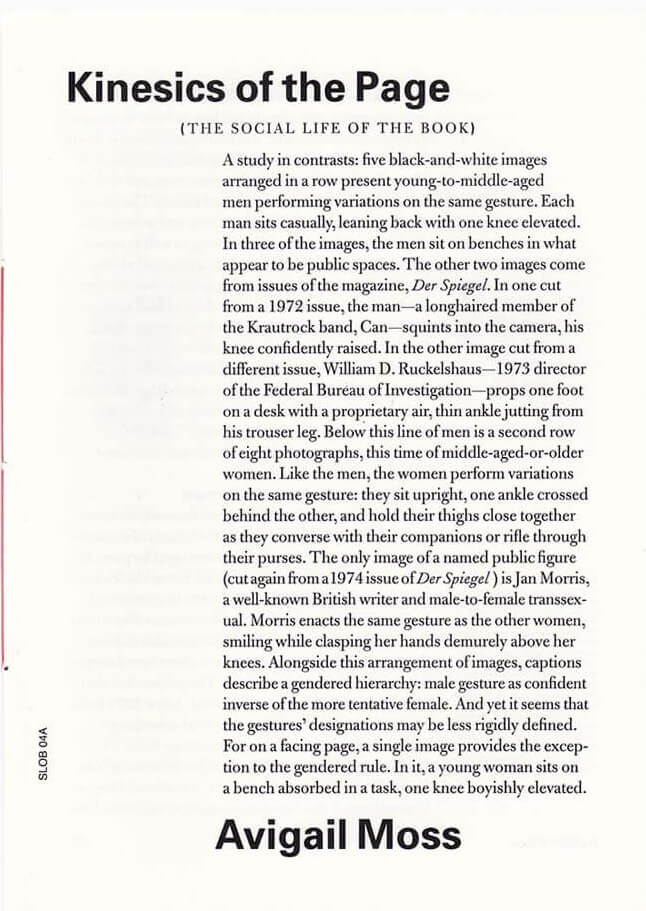
Kinesics Of The Page
This installment written by LA-based artist and writer Avigail Moss, develops as a thorough analysis of one particular book: Marianne Wex’s outstanding photo-essay Let’s Take Back Our Space: “Female” and “Male” Body Language as a Result of Patriarchal Structures, from 1979. Moss proposes a contextual approach of the book, in relation to politics and feminism in post-war West Germany, as well as a minute study of its design and page structure, revealing the complexity and force of the volume.
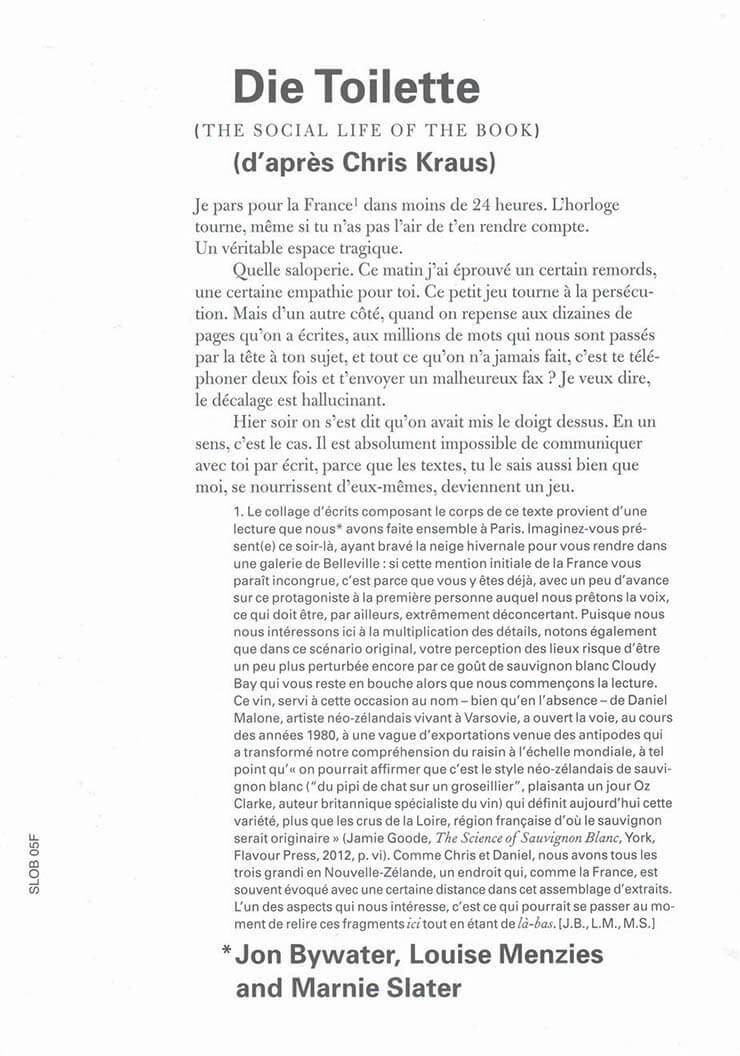
Die Toilette
Marnie Slater, Louise Menzies and 1 more
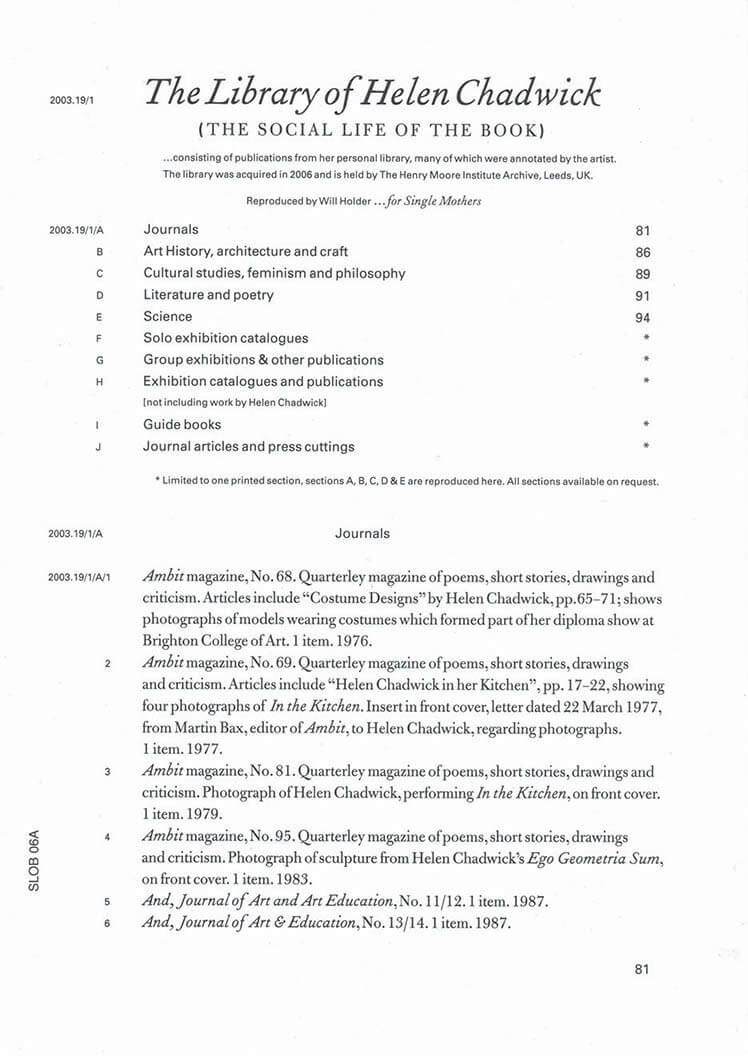
The Library of Helen Chadwick
The 6th installment of The Social Life of the Book series is a section of the catalogue of publications from English conceptual artist Helen Chadwick’s personal library, reproduced by Will Holder for single mothers. The library was acquired in 2006 and is held by the Henry Moore Institute archive, Leeds, UK.
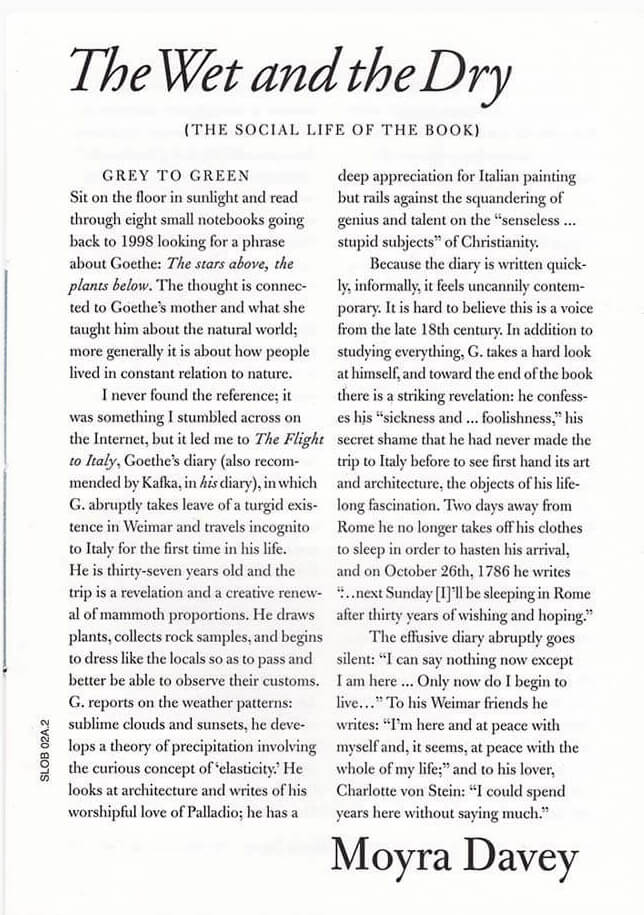
The Wet and The Dry
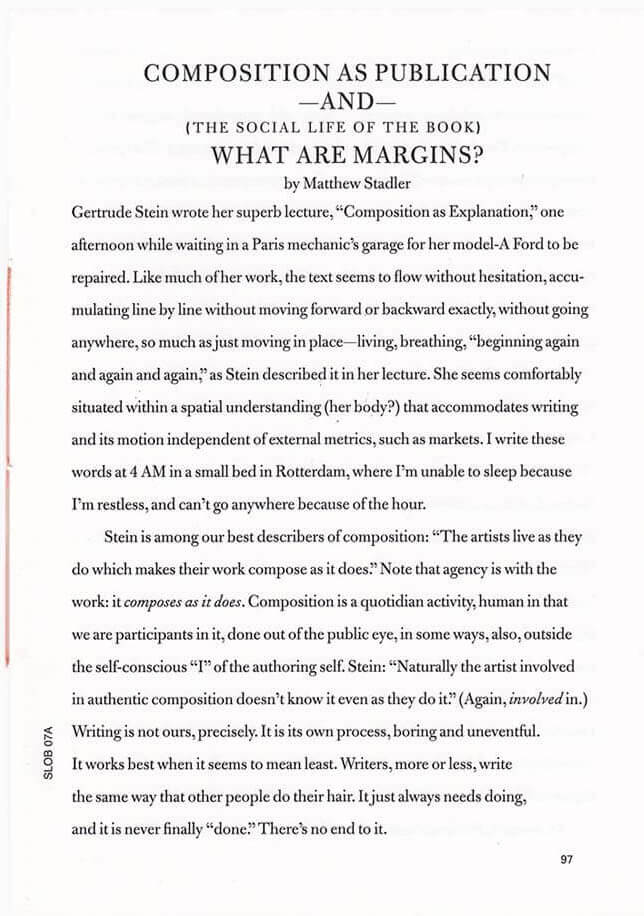
Composition As Publication – And – What Are Margins
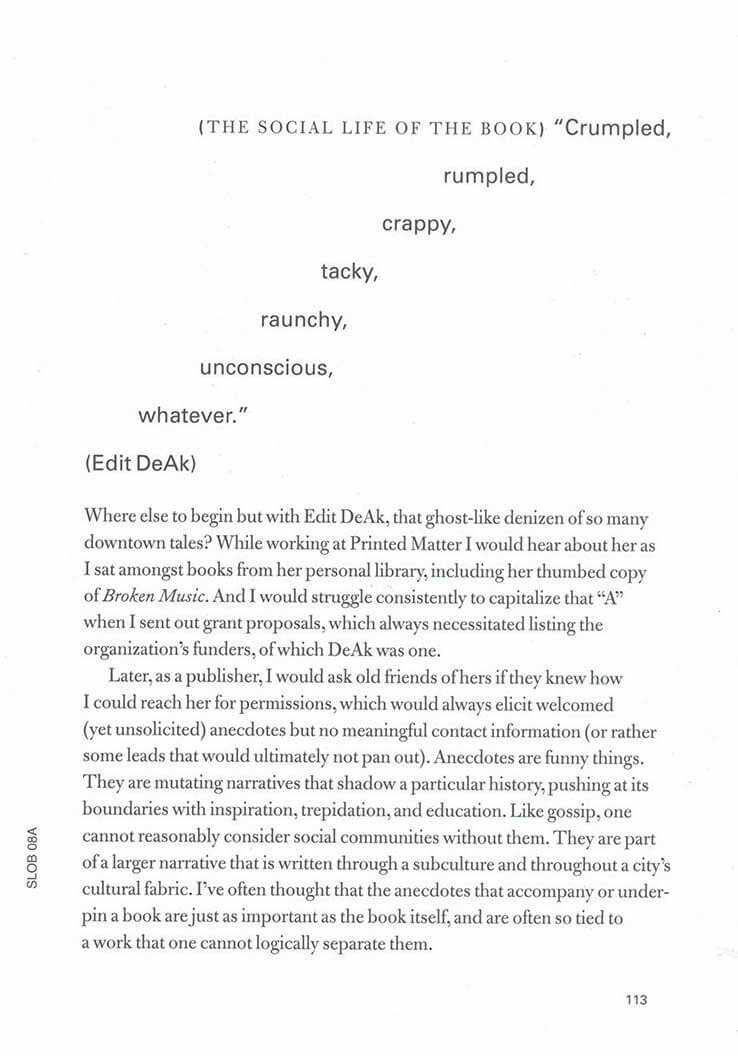
CRUMPLED, RUMPLED, CRAPPY, TACKY, RAUNCHY, UNCONSCIOUS, WHATEVER
An artist, a musician, and a publisher based in Brooklyn, NY, James Hoff tells here how books got him into art. He considers the complex and stimulating fabric of anecdotes, gossip, secrets, that are shared around artists’ publications, and, further, the role of printed matter in the building of an artist’s community. The essay pays homage to Edit DeAk through its title, and also comprises some pictures of book covers and LP sleeves from Hoff’s collection.
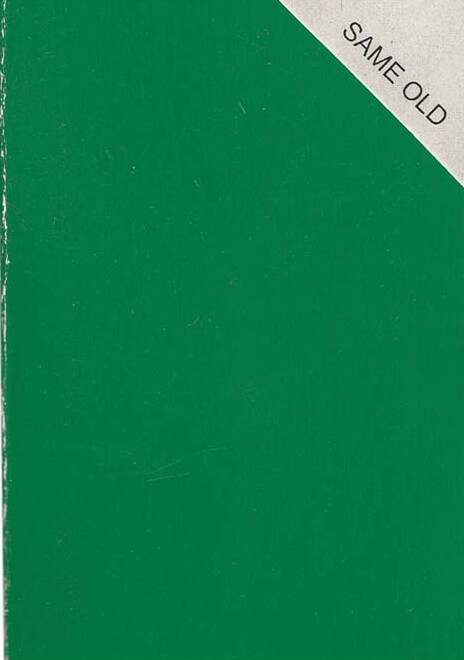
Same Old (new book)
Same old (new book), featuring some cut up drawings because sometimes you just gotta. ~6x9cm ~400p , Glued by hand with shiny cover.
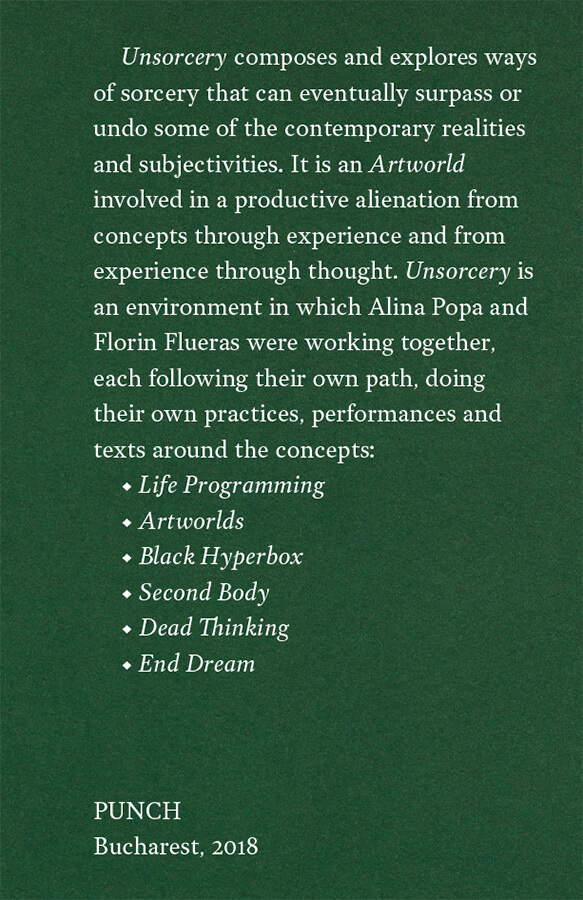
Unsorcery
Unsorcery composes and explores ways of sorcery that can eventually surpass or undo some of the contemporary realities and subjectivities. It is an Artworld involved in a productive alienation from concepts through experience and from experience through thought. Unsorcery is an environment in which Alina Popa and Florin Flueras were working together, each following their own path, doing their own practices, texts and performances around the concepts: Life Programing, Artworlds, Black Hyperbox, Second Body, Dead Thinking, End Dream.
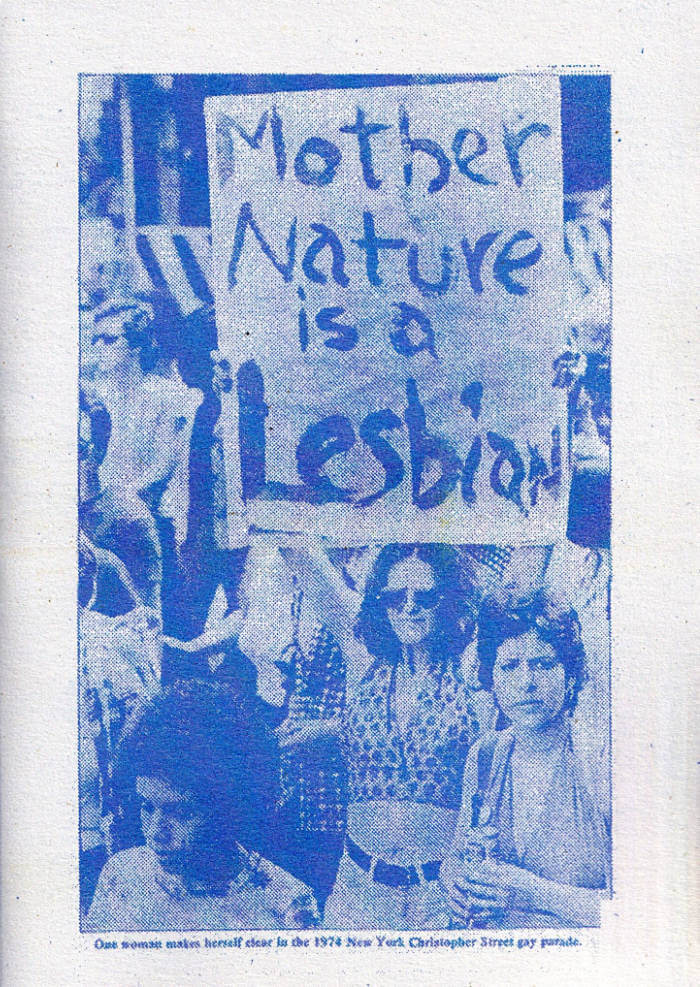
Mother Nature is a Lesbian
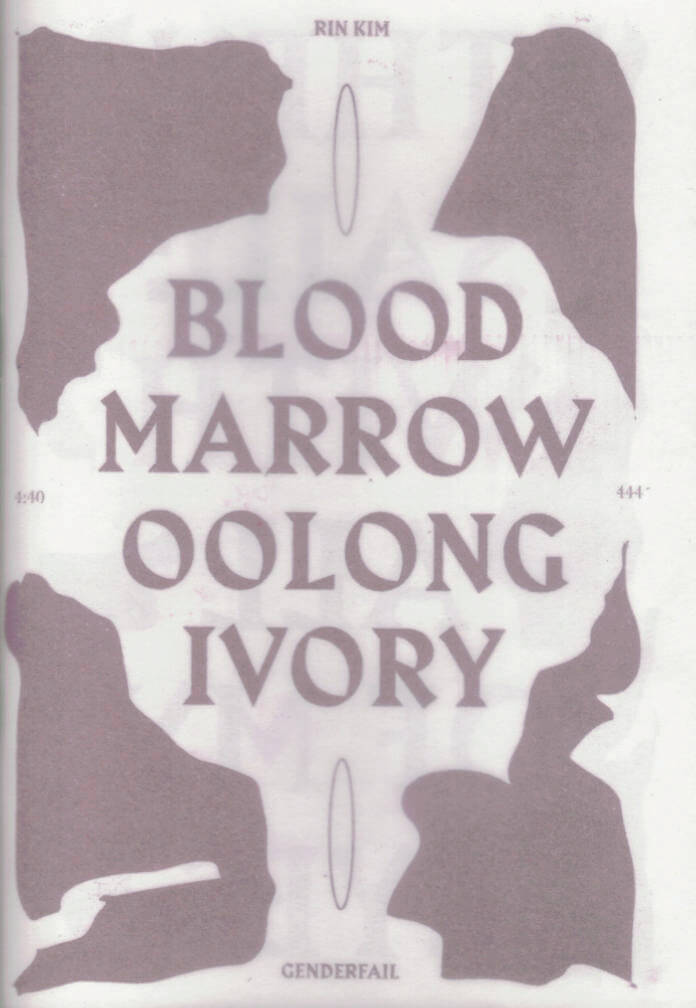
Blood Marrow Oolong Ivory
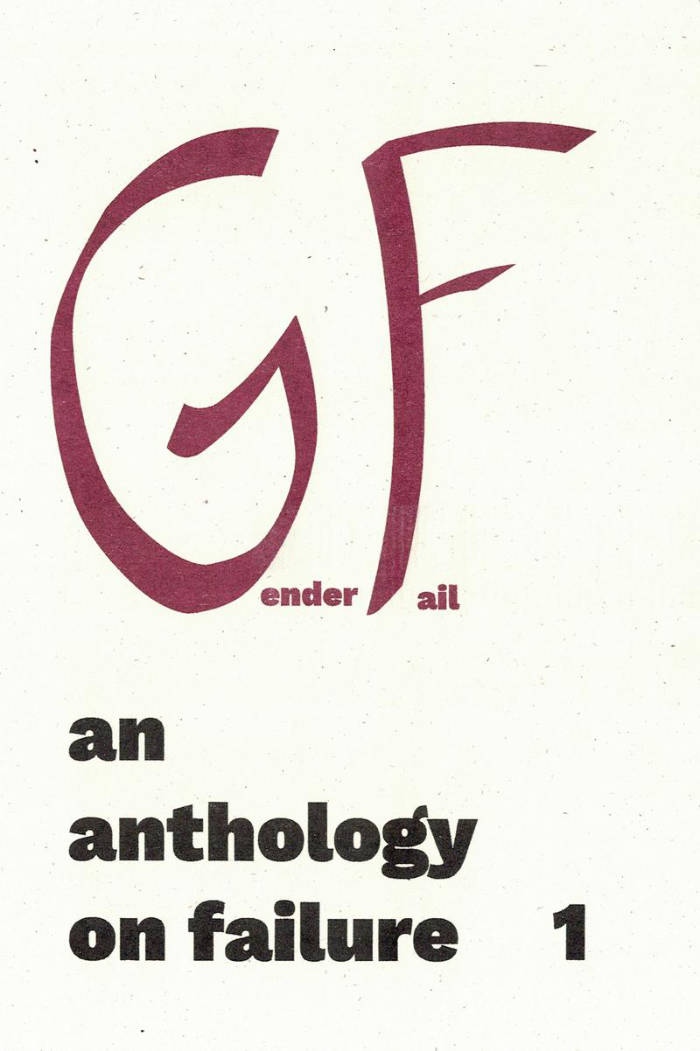
Anthology of Failure
GenderFail: An Anthology On Failure is the first in a series of publications that look into various concepts of failure from the perspectives of artists, activists, writers, and curators. The failures discussed in this publication come from various different places - from personal, political, institutional, and collective sources. Each participant was invited to contribute a work surrounding failure - especially as it pertains to their own experiences - to expand upon topics of ableism, mental health, passing, whiteness, colonization, police brutality and other illustrations of failure put onto us by dominant culture. This resulting collection might fail to articulate a cohesive interpretation of something as complex as failure, but will hopefully incite a collective consciousness that is as messy as it is thought provoking.
Contributions by: Manuel Arturo, Abreu, American Artist, Sasha Costanza-Chock, Demian DinéYazhi, Johanna Hedva, Nicole Killian, Andrea Liu, Be Oakley, Nate Pyper, Sable Elyse smith, Alok Vaid-Menon, Augustine Zegers.
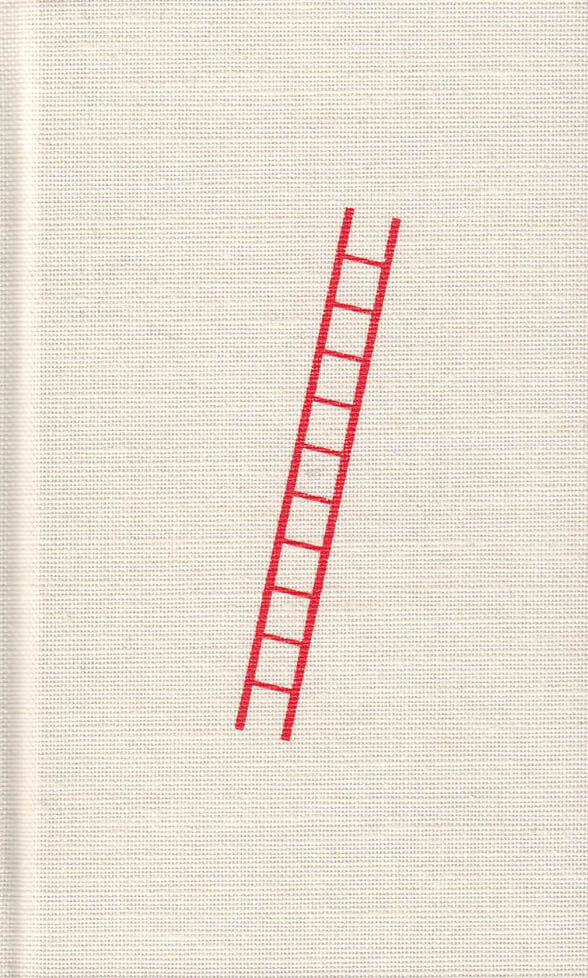
Traversals
TRAVERSALS is based on a series of conceptual interviews with Dora Garcia, Chris Kraus, Mark von Schlegell, Charles Stankievech, and Jacob Wren originally produced for an installation in an art gallery. As a re-issue of these texts, the publication continues K.'s interest in the book-as-exhibition. Each invited contributor has found a unique way to explore the hybrid spaces between genres and art forms, and the discussions focus especially on the role and relationship between visual art and writing.
While the interview process was rather formalized—with one set of five identical questions posed to each person in the first round, and then five individual questions asked in a second round in response to the first five answers—the texts themselves delight through a personal tone and a great openness for both idiosyncratic trajectories and unexpected traversals between the five different chapters.
Contributors: Dora Garcia, Chris Kraus, Charles Stankievech, Mark von Schlegell, Anna-Sophie Springer, Jacob Wren
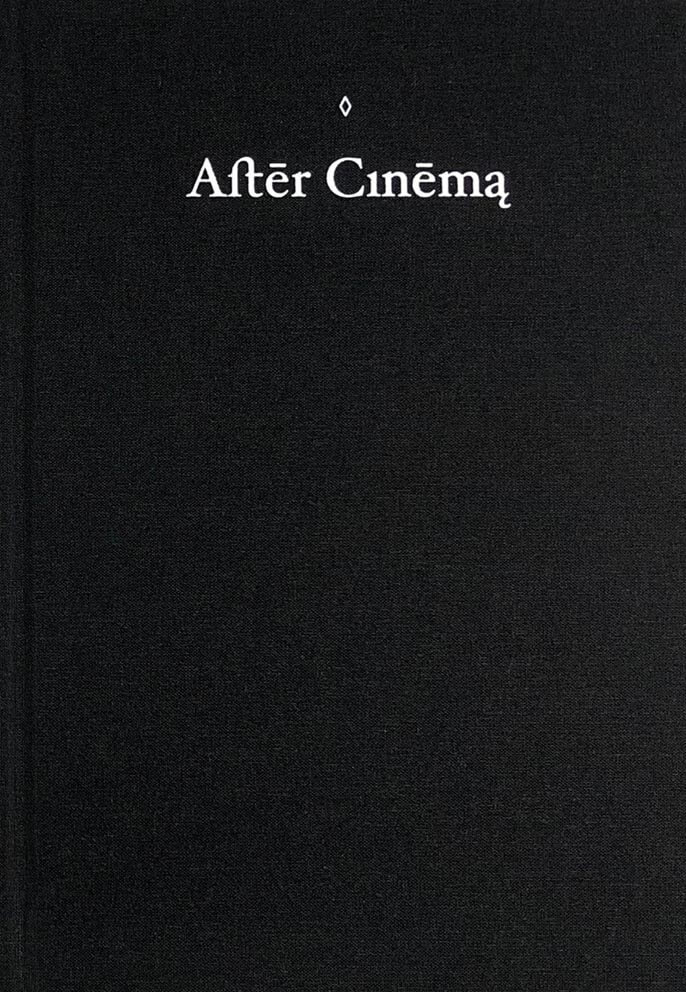
After Cinema
This book marks the ten-year anniversary of the project A Collective Memory by Azin Feizabadi. The project encompasses five narrative-driven films, alongside other artworks. Each film has its own urgency, approach, and point of departure. The films naturally vary in their subjects, they touch upon stories of migration, uprising, transformation, revolution, renewal, collapse, defeat, depression, and desire that connect the life of the artist with those around him. The research materials that have come up over the course of this project consist, on the one hand, of concrete historical events and, on the other hand, all the innumerable, fragmented personal memories spread between pats, presents, and futures that narrate every-changing stories of how things were, are, and may be.
Contributors: Jens Maier-Rothe & Ashkan Sepahvand (co-editors) Shahab Fotouhi, Nanna Heidenreich, Sarah Rifky, Rasha Salti, Ashkan Sepahvand, Jan Verwoert, Chiara Figone

The Word For World is Still Forest
The Word for World is Still Forest creates a space for the reader-as-exhibition-viewer to consider how forests may be seen not only for their trees, but also how they can enable experiences of elegance, affirmation, and creation for a multitude of creatures. in response to their violent destruction, which characterizes the Anthropocene, these pages traverse various woodlands by way of their semiotic, socio-political, historical, and epistemic incitements in order to reveal how practices of care, concern, and attention also enable humans to inhabit and flourish in this world as forest. Taking its title from Ursula K. Le Guin’s 1972 novella, The Word for World is Still Forest curates an homage to the forest as a turbulent, interconnected, multinature. Moving from concepts of the forest as a thinking organism to the linear monocultural plantations that now threaten the life of global forests, the volume includes interviews, a photo essay, case studies, reflections, drawings, essays and more.
Contributors: Sandra Bartoli, Kevin Beiler, Shannon Castleman, Dan Handel, Katie Holten, Elise Hunchuck, Silvan Linden, Yanni A. Loukissas, Eduardo Kohn, Pedro Neves Marques, Abel Rodríguez, Carlos Rodríguez, Suzanne Simard, Anna-Sophie Springer, Paulo Tavares Etienne Turpin, Catalina Vargas Tovar